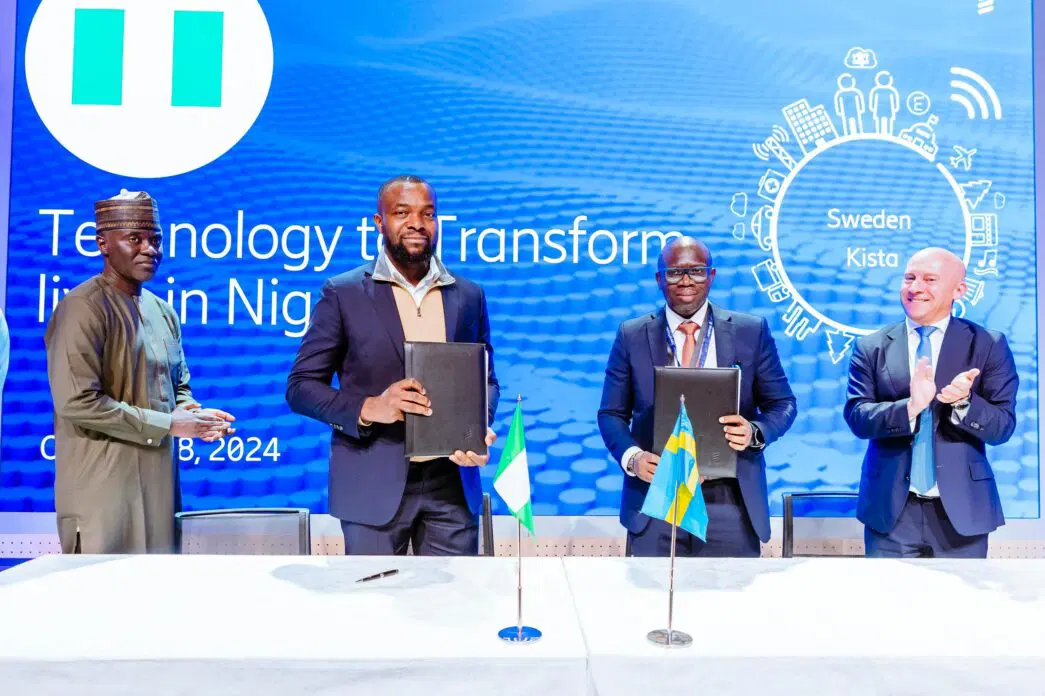
Nigeria, Ericsson partner on 5G innovation hub
Nigeria has taken a significant step towards advancing its digital economy with the signing of a Memorandum of Understanding, MoU between the Nigerian government and Ericsson.
This partnership is aimed at accelerating 5G technology development, deployment, and innovation, positioning Nigeria as a key player in the digital landscape of Africa.
The MoU was signed by Nigeria’s Minister of Communications, Innovation, and Digital Economy, Bosun Tijani, and Country Manager of Ericsson Nigeria, Peter Ogundele, at Ericsson’s global research and development lab in Kista, Sweden. Vice-President Kashim Shettima and Patrick Johansson, Ericsson’s Senior Vice-President and Head of Business Area, Middle East and Africa, witnessed the event.
This partnership is not just about introducing new technology—it is a commitment to leveraging 5G to address critical national challenges.
Vice-President Shettima, during a presentation by Ericsson professionals, highlighted the potential of 5G technology to enhance the security of Nigeria’s vital oil facilities.
He asked for insights on how 5G can be utilized to curb oil theft and protect oil pipelines, which are critical to the country’s economy.
“The security of our oil infrastructure is of utmost importance. How can 5G technology help us protect our oil pipelines and combat the ongoing issues of theft and vandalism?” Shettima queried.
Expanding 5G’s reach beyond connectivity
Beyond security, the MoU is designed to explore the broader application of 5G technology in key sectors like agriculture, mining, and education, all in alignment with President Bola Tinubu’s “Renewed Hope” agenda.
According to Minister Tijani, the creation of a 5G innovation hub will foster the development of tailored solutions to improve lives and diversify the Nigerian economy.
“This agreement allows us to fully explore the potential of 5G in boosting sectors like agriculture and mining, which are crucial for Nigeria’s economic transformation. With these advancements, we can significantly improve productivity, ensure nationwide connectivity, and elevate our global competitiveness,” Tijani stated.
As one of the few African nations to have launched 5G technology, Nigeria is already on a path to increased connectivity. This new partnership aims to build on that foundation, ensuring that the benefits of 5G extend beyond urban centers to rural areas and critical industries.
Strengthening bilateral ties with Sweden
The Vice-President’s visit to Sweden underscores the importance of Nigeria’s strategic partnerships with global leaders in technology and innovation. Sweden, home to global technology giants like Ericsson, has long been recognized as a model of technological growth and economic resilience.
Tijani emphasized the significance of deepening this bilateral relationship to further Nigeria’s digital and economic reforms.
“Sweden is a global powerhouse in technology, and our collaboration with Ericsson represents a significant step in aligning Nigeria with cutting-edge innovations that can drive our economic competitiveness.
This MoU is not just about technology; it’s about creating a framework for long-term growth and development,” Tijani noted.
By harnessing the strength of both nations, Nigeria aims to position itself as a leader in 5G innovation, ensuring that the digital economy serves as a catalyst for national development.